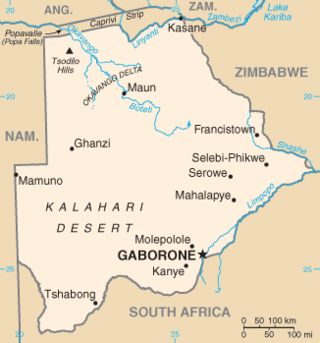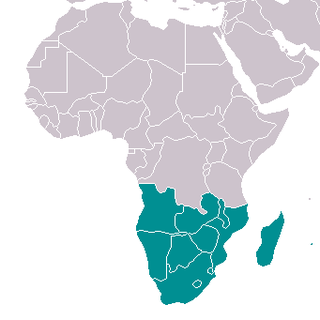
Rhodesia, officially from 1970 the Republic of Rhodesia, was an unrecognised state in Southern Africa from 1965 to 1979. During this fourteen-year period, Rhodesia served as the de facto successor state to the British colony of Southern Rhodesia, and in 1980 it became modern day Zimbabwe.

Zimbabwe-Rhodesia, alternatively known as Zimbabwe Rhodesia, also informally known as Zimbabwe or Rhodesia, was a short-lived sovereign state that existed from 1 June 1979 to 18 April 1980, though it lacked international recognition. Zimbabwe Rhodesia was preceded by another state named the Republic of Rhodesia and was briefly under a British-supervised transitional government sometimes referred to as a reestablished Southern Rhodesia, which according to British constitutional theory had remained the lawful government in the area after Unilateral Declaration of Independence (UDI) in 1965. Following the 1980 Southern Rhodesian general election, the country was granted internationally-recognized independence within the Commonwealth as the Republic of Zimbabwe.

The Internal Settlement was an agreement which was signed on 3 March 1978 between Prime Minister of Rhodesia Ian Smith and the moderate African nationalist leaders comprising Bishop Abel Muzorewa, Ndabaningi Sithole and Senator Chief Jeremiah Chirau. After almost 15 years of the Rhodesian Bush War, and under pressure from the sanctions placed on Rhodesia by the international community, and political pressure from South Africa, the United Kingdom, and the United States, the Rhodesian government met with some of the internally based moderate African nationalist leaders in order to reach an agreement on the political future for the country.
United Nations Security Council Resolution 253, adopted unanimously on May 29, 1968, after reaffirming previous resolutions, the Council noted with concern that the measures taken so far have failed to bring the rebellion in Southern Rhodesia to an end and condemned the recent "inhuman executions carried out by the illegal regime in Southern Rhodesia which have flagrantly affronted the conscience of mankind". After further condemning the regime and calling upon the United Kingdom to end the rebellion in Southern Rhodesia the Council decided that all member states would:
United Nations Security Council Resolution 277, adopted on March 18, 1970, concerned the state of Southern Rhodesia, now known as Zimbabwe. The Council reaffirmed its previous resolutions and noted with grave concern that efforts thus far to bring the rebellion to the end had failed, some countries had not been obeying the Council's resolutions and that the situation in Southern Rhodesia continued to deteriorate as a result of the regime's new measures.
United Nations Security Council Resolution 386, adopted unanimously on March 17, 1976, noted statements made by the President and Minister for Foreign Affairs of the People's Republic of Mozambique and also expressed its concern regarding the situation created by the provocative, aggressive acts committed by the illegal minority regime in Rhodesia. The Council reaffirmed their earlier work regarding Rhodesia, including their resolutions imposing sanctions on that country and noted their appreciation with Mozambique's co-operation with that plan. The Resolution then condemns Rhodesia's aggressive acts, including military incursions, against Mozambique and noted the urgent and special economic need of Mozambique who arose from its implementation of resolution 253.
United Nations Security Council Resolution 409, adopted on May 27, 1977, reaffirmed the Council's previous resolutions and affirmed that the policies created by them would remain in place. The Council, acting under Chapter VII, further decided that all member states should prohibit the use of funds in their territory from use by Rhodesia and/or Rhodesian citizens, save for pensions. The Resolution also decided that the Committee established in Resolution 253 (1968) should examine possible uses of Article 41 of the Charter of the United Nations.

United Nations Security Council Resolution 406, adopted on May 25, 1977, after reaffirming resolutions 403 (1977), 232 (1966) and 258 (1965) and reading a report from the Mission in Botswana, the Council expressed its full support to the Government of Botswana against continued attacks and provocations by the "illegal racist regime" in Southern Rhodesia.
United Nations Security Council Resolution 411, adopted unanimously on June 30, 1977, noted statements made by officials of the People's Republic of Mozambique and also expressed its concern regarding the situation created by the provocative, aggressive acts committed by the illegal minority regime in Rhodesia. The Council reaffirmed their earlier work regarding Rhodesia, including their resolutions imposing sanctions on that country and noted their appreciation with Mozambique's co-operation with that plan. The Resolution then condemns Rhodesia's aggressive acts, including military incursions, against Mozambique and noted the urgent and special economic need of Mozambique who arose from its implementation of resolution 253.

In United Nations Security Council Resolution 423, adopted on March 14, 1978, after recalling its resolutions on Southern Rhodesia, particularly 415 (1977), the Council condemned attempts by the "illegal racist regime" in Southern Rhodesia to retain power and prevent the independence of Zimbabwe. It also criticised the country's executions of political prisoners and actions against neighbouring countries.

United Nations Security Council Resolution 424 was adopted unanimously on March 17, 1978; after hearing representations from Zambia, the Council expressed concern at unprovoked attacks against the country by the "illegal racist regime" in Southern Rhodesia, which resulted in deaths and destruction of property in Zambia. The Rhodesian Security Forces maintained that they had been attacking guerrilla bases in the country.

United Nations Security Council Resolution 437, adopted on October 10, 1978, recalled Resolution 253 (1968), which prohibited Member States from allowing individuals connected to the regime in Southern Rhodesia to enter their territory. The Council noted with regret that the United States had allowed Ian Smith and other members of the "illegal regime" to enter the country, considering this action a violation of Resolution 253.

United Nations Security Council resolution 448, adopted on 30 April 1979, after recalling resolutions 253 (1968), 403 (1977), 411 (1977), 423 (1978), 424 (1978), 437 (1978) and 445 (1979), the Council declared that the recent "sham" elections held in Southern Rhodesia by the "illegal racist regime" were illegal and the results thereof would be null and void.

United Nations Security Council resolution 455, adopted on 23 November 1979, after taking note of representations from Zambia and recalling Resolution 424 (1978), the Council expressed concern and condemned the "illegal racist regime" in Southern Rhodesia for its "sustained pattern of violations aimed at destroying the economic infrastructure" of Zambia and causing a number of deaths.
United Nations Security Council resolution 460, adopted on 21 December 1979, after taking note of the Lancaster House Agreement, the council decided to terminate measures taken against Southern Rhodesia in resolutions 232 (1966) and 253 (1968) and any subsequent resolutions. The resolution deplored the "loss of life, waste and suffering" over the past 14 years caused by the rebellion in southern Rhodesia.

United Nations Security Council resolution 546, adopted on 6 January 1984, after hearing representations from the People's Republic of Angola, the council recalled resolutions 387 (1976), 428 (1978), 447 (1979), 454 (1979), 475 (1980) and 545 (1983), and expressed its concern at the continuing attacks on the country by South Africa through occupied South West Africa.

United Nations Security Council resolution 566, adopted on 19 June 1985, after recalling resolutions 269 (1969), 276 (1970), 301 (1971), 385 (1976), 431 (1978), 432 (1978), 435 (1978), 439 (1978), 532 (1983) and 539 (1983), the Council expressed concern at the tension and instability caused the continued occupation of Namibia by South Africa, noting the apartheid policies implemented in the territory and that the territory was used as a springboard for attacks on other southern African countries.

Rhodesian passports were passports issued by the government of Rhodesia to its citizens for purposes of international travel. They are no longer issued, having been superseded by Zimbabwean passports in 1980, with the country's reconstitution and renaming as Zimbabwe. Rhodesian passports were ostensibly valid for travel by Rhodesians anywhere in the world, but in practice they were accepted by very few countries.

The Rhodesia Information Centre (RIC), also known as the Rhodesian Information Centre, the Rhodesia Information Service, the Flame Lily Centre and the Zimbabwe Information Centre, represented the Rhodesian government in Australia from 1966 to 1980. As Australia did not recognise Rhodesia's independence, it operated on an unofficial basis.
The Rhodesian government actively recruited white personnel from other countries from the mid-1970s until 1980 to address manpower shortages in the Rhodesian Security Forces during the Rhodesian Bush War. It is estimated that between 800 and 2,000 foreign volunteers enlisted. The issue attracted a degree of controversy as Rhodesia was the subject of international sanctions that banned military assistance due to its illegal declaration of independence and the control which the small white minority exerted over the country. The volunteers were often labelled as mercenaries by opponents of the Rhodesian regime, though the Rhodesian government did not regard or pay them as such.










